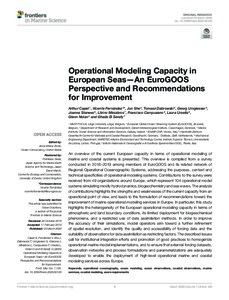Operational Modeling Capacity in European Seas — An EuroGOOS Perspective and Recommendations for Improvement.

View/
Average rating
votes
Date
2020Author
Capet, Arthur
Fernández, Vicente
She, Jun
Dabrowski, Tomasz
Umgiesser, Georg
Staneva, Joanna
Mészáros, Lőrinc
Campuzano, Francisco
Ursella, Laura
Nolan, Glenn
El Serafy, Ghada
Metadata
Show full item recordAbstract
An overview of the current European capacity in terms of operational modeling of marine and coastal systems is presented. This overview is compiled from a survey conducted in 2018–2019 among members of EuroGOOS and its related network of Regional Operational Oceanographic Systems, addressing the purposes, context and technical specificities of operational modeling systems. Contributions to the survey were received from 49 organizations around Europe, which represent 104 operational model systems simulating mostly hydrodynamics, biogeochemistry and sea waves. The analysis of contributions highlights the strengths and weaknesses of the current capacity from an operational point of view, and leads to the formulation of recommendations toward the improvement of marine operational modeling services in Europe. In particular, this study highlights the heterogeneity of the European operational modeling capacity in terms of atmospheric and land boundary conditions, its limited deployment for bi.....
Journal
Frontiers in Marine SciencesVolume
7Issue
Article 129Document Language
enSustainable Development Goals (SDG)
14.ABest Practice Type
Best PracticeDOI Original
10.3389/fmars.2020.00129Citation
Capet, A.; Fernández, V.; She, J.; Dabrowski, T.; Umgiesser, G.; Staneva, J.; Mészáros, L.; Campuzano, F.; Ursella, L.; Nolan, G. and El Serafy, G. (2020) Operational Modeling Capacity in European Seas — An EuroGOOS Perspective and Recommendations for Improvement. Frontiers in Marine Science, 7:129. 19pp. DOI: 10.3389/fmars.2020.00129Collections
 Repository of community practices in Ocean Research, Applications and Data/Information Management
Repository of community practices in Ocean Research, Applications and Data/Information Management